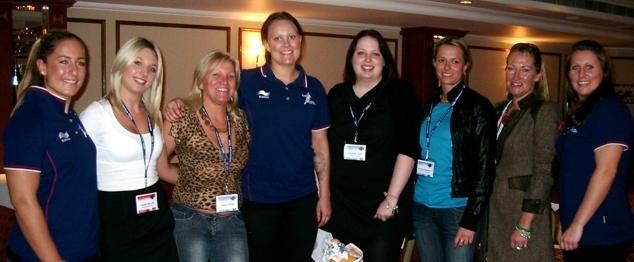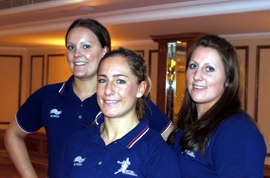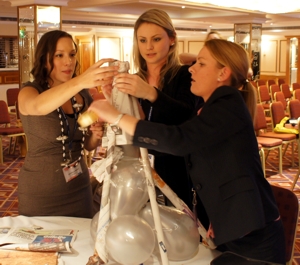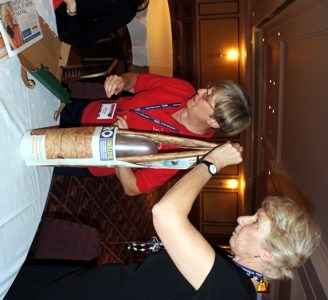The visitors and exhibitors who managed to find time to attend the Professional Women in Pest Management (PWIPM) gathering at PestTech were rewarded with an exciting teambuilding exercise.
British Women”s Handball squad members, Louise Jukes, Britt Goodwin and Jeanett Andersen provided a fascinating whistle stop tour of what handball is all about before breaking the PWIPM group up into three teams for a teambuilding excercise.
The link between the British Handball team and pest control becomes clearer when you learn that PestWest Electronics is now sponsoring the supporters’ club in the team’s build-up to London 2012.
|
Everyone in the room, other than the three squad members, freely admitted to knowing nothing about the sport. However, globally it has a huge following with, for example 1.13 billion people watching the Euro 2010 women’s championships. In fact it is the most popular sport for women participants in the world and the second most popular for men (presumably after soccer). Worldwide there are some 800,000 teams. Handball has been an Olympic sport since 1972, but London 2012, next August, will be the first time ever that a British team will have competed at the Olympics. The game claims to be the fastest ball sport in the world. It is played by two teams over two halves of 30 minutes each, with a 15 minute break. The aim is to score as many goals as possible. Each team has seven players (including a goalkeeper) in play at any one time with a further seven on the bench who can be swapped in and out of the team. There is a hockey-sized goal and the ball is a bit smaller than a football. “It’s a fast, exciting, contact sport if the video clips the ladies showed us are anything to go on,” explainsPestassociate editor Helen Riby. “Just watching for a few minutes, it quickly became apparent that the position of goalkeeper is one that’s definitely not for the feint hearted!” With the Olympics fast approaching the British women’s squad is following a centralised programme. Because it’s such a small sport in the UK the squad play their handball in other countries. Louise plays for a Norwegian club, Britt was born in Norway and has also played in Norway but her parents are both from Manchester, hence she qualifies to play for Great Britain and Jeanett plays her handball in Denmark but has dual nationality having a Danish mum and a British dad. As Louse explained: “We’ve all been based in London for the past 12 months and this has had a huge impact on how we work together as a unit. We’ve got to know each other really well and we’ve learnt how to use each other’s strengths.” Not all of the teambuilding has been based around handball. “One of the most challenging days was an Army day where we learnt the value of taking a step back and thinking, rather than at shouting at each other and rushing into things,” she added. One of the most important lessons, which is applicable across all walks of life, is to set small achievable goals; stepping stones towards improvement. |
|
|
|
For example when the team recently played the world champions Russia they knew they would be unlikely to win but they set three objectives: to score 20 goals themselves, to make no more than 20 mistakes technically and to save 35% of the shots. Even though we lost 24 to 16, it felt like we had won,” they said. So what was the exercise the PWIPM delegates were asked to do? Helen Riby explains: “We were given plenty of newspaper, a variety of different balloons, one piece of stiffish card, a roll of sellotape and an egg. Our objective was to build as tall a tower as possible. The tower had to support the raw egg on top for at leasts 30 seconds. We also had to come up with a name for our tower and all in ten minutes!” It certainly got everyone talking to each other and interacting. “I’m pleased to report that all three teams managed to build a tower which successfully supported the egg so happily there was no eggy mess to clera up in the conference room,” adds Helen. The winning tower named ‘Eggstraordinary’ was built by Tuesday Bennett from Brandenburg, Tracey Farmans from 3 Counties Pest Control, Charlotte Taylor of Xenex Associates, Natalie Bungay from Leeds City Council and Henrietta Thomas from DT Construction. Wrapping up the session Louise Jukes explained how even short teambuilding sessions such as this can be really useful, especially if you take time afterwards to reflect on the experience – thinking about how you performed in the group, what you did well, how you could have had more impact, what the team’s strengths and weaknesses were and so on. These are all lessons which are as useful in the boardroom, the office and at the pest control coalface as they are in any sport. The PWIPM session was sponsored by Pest Contol News and the speakers provided courtesy of PestWest, who are supporting the Britsh Handball team in its bid for Olympic glory.
|
||





